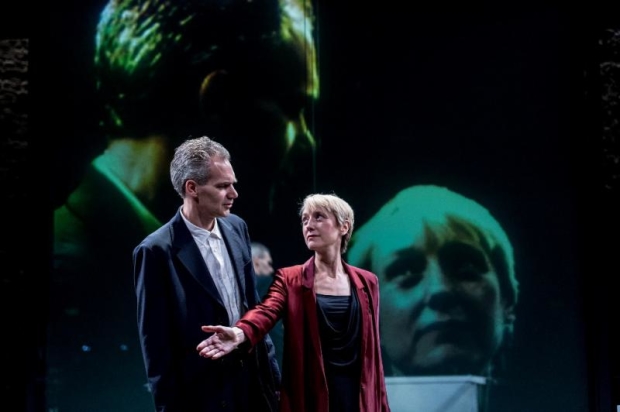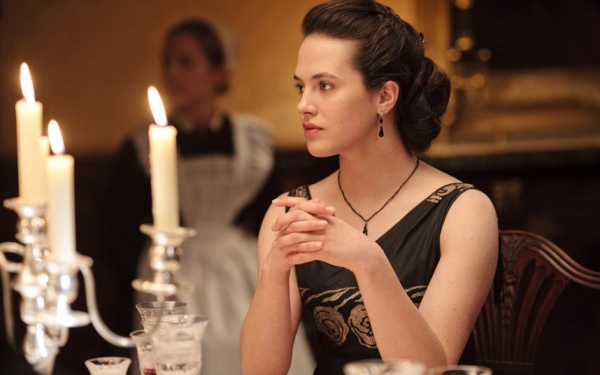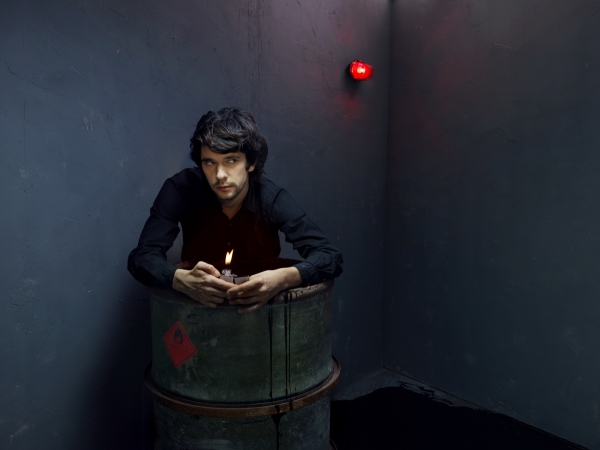Oresteia (Almeida Theatre)

© Manuel Harlan
The Oresteia – the trilogy of plays by Aeschylus dating from the 5th century BC – is a fountainhead of our drama: war, revenge, a tribal curse, a fear of fate, family tragedy – and all of that is fully honoured in this sleek, modish, zippy three-and-a-half-hours production by Robert Icke.
An onstage clock ticks down during the intervals. Scenes are relayed round the auditorium on screens. The murders are committed onstage (always "off" in Greek tragedy), the thoughts of the Chorus dispelled among other characters on a stage of sliding glass panels and bleak chic grey furniture (design by Hildegard Bechtler), the sacrificial theme tune for Iphigenia is the Beach Boys’ "God only knows what I’d do without you".
Ah, the gods. Not just Olympian deities any more, but an all-purpose conglomerate – litanised in the opening speech – of Jehova, Osiris, Buddha, Odin, the All-Knowing etc. It’s not clear what source or translation Icke’s "adaptation" is drawing on; but it’s an authoritarian rather than hieratic society he and the actors suggest, with blood on the table cloth, all over the bathroom (there’s a blood bath) and an emphasis on domestic disaster seeping, as it does in Aeschylus, into a democratic vote on the guilt of Orestes while refurbishing a notion of Aeschylean patriarchy.
The outline is simple: Agamemnon (Angus Wright) is killed by his wife Clytemnestra (Lia Williams) for sacrificing their daughter Iphigenia (little Clara Read on press night) in exchange for a fair wind to the wars (not necessarily Trojan any more). Orestes (Luke Thompson), aided by his other sister Electra (Jessica Brown Findlay), kills his mother and her lover Aegisthus (also played by Wright) and is tried in court, after being driven mad not by the Furies but his own demons, which is fair enough.
Icke prefaces the three plays – Agamemnon, the Libation Bearers and The Furies – with a new one, a dramatisation (and, in effect, a flattening-out) of the two great speeches of the Chorus and Clytemnestra at the start of the first play. This is all part of proving that the family that stays together preys together.
And it sets a determinedly casual and domestic tone while obliterating the distinctions between gods, chorus and human royalty; when these were maintained in Peter Hall’s great National Theatre production (all-male, all-masked), not least due to Tony Harrison’s alliterative Middle English text, you never felt the plays were not about "us".
That was a long time ago. The Almeida version, though visually exciting and involving, especially if you haven’t seen the plays before, is more reductive than genuinely outrageous, the Athenian jury more Crown Court than Areopagus. And the acting, though fairly good, is not special. Lia Williams at least has something crazed, dangerous and very blonde about her, brutally describing Cassandra as that "foreign import".
At the heart of this is the issue of how we should possess Greek tragedy today. Do we go towards the meaning of the plays or insist on dragging them into our own cultural orbit? Is the choice between artistic truth or a colonising, creative narcissism? It will be fascinating to see how this Greek season progresses with the more obviously "modern" Bakkhai and Medea of Euripides.












